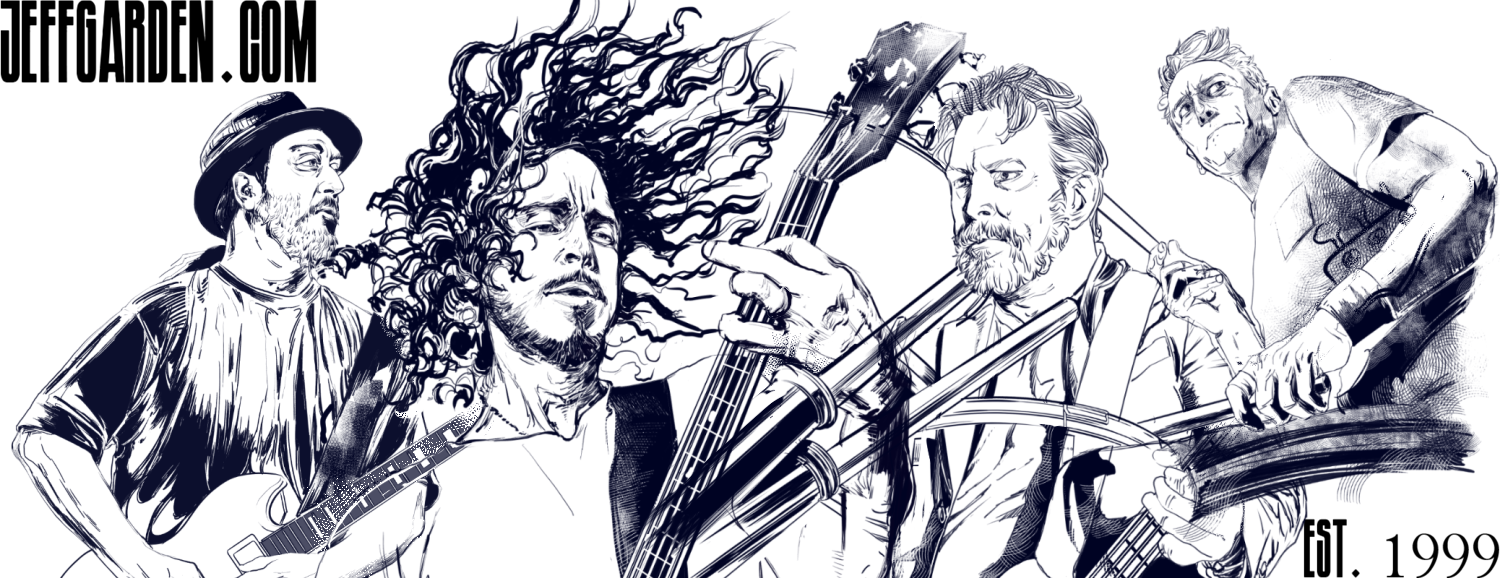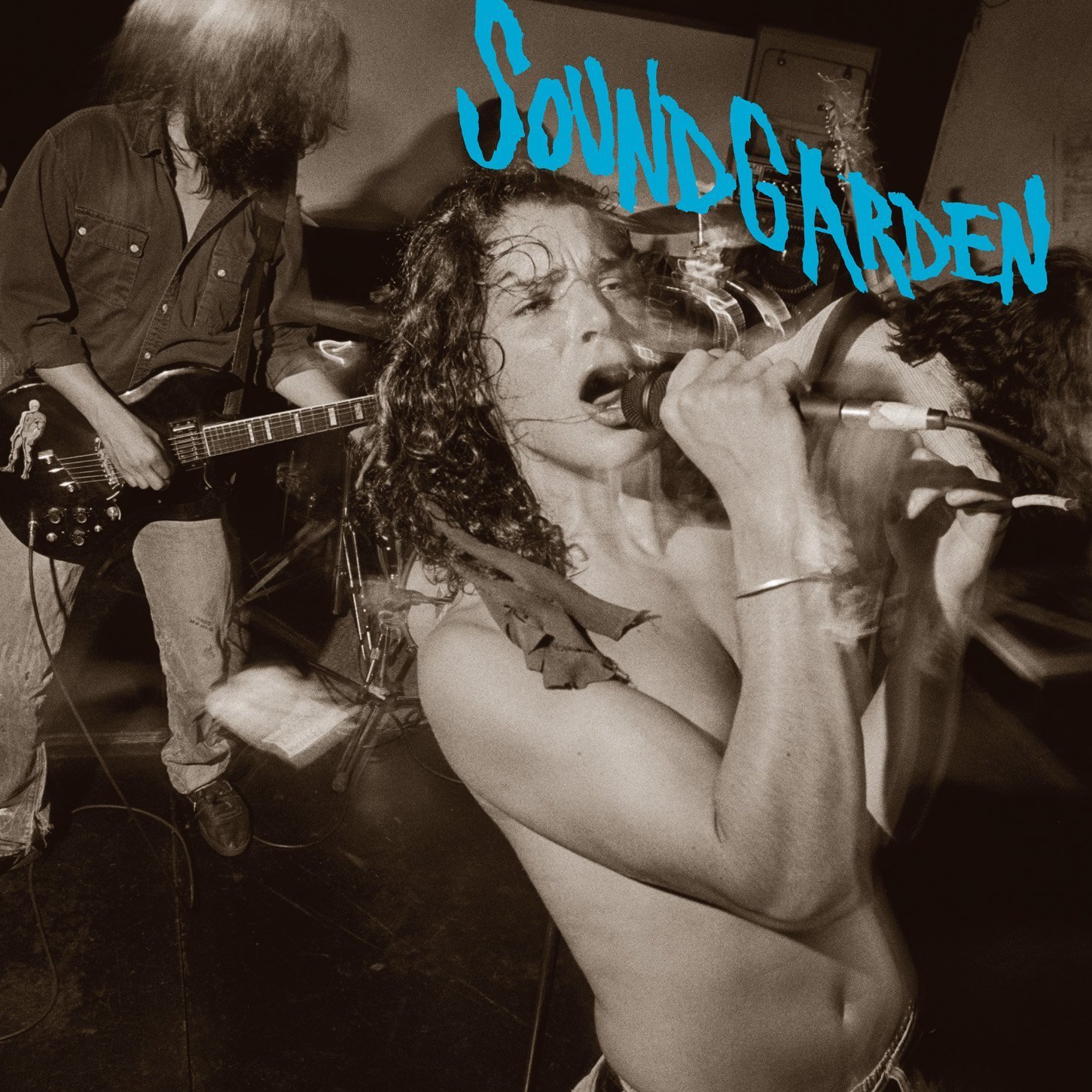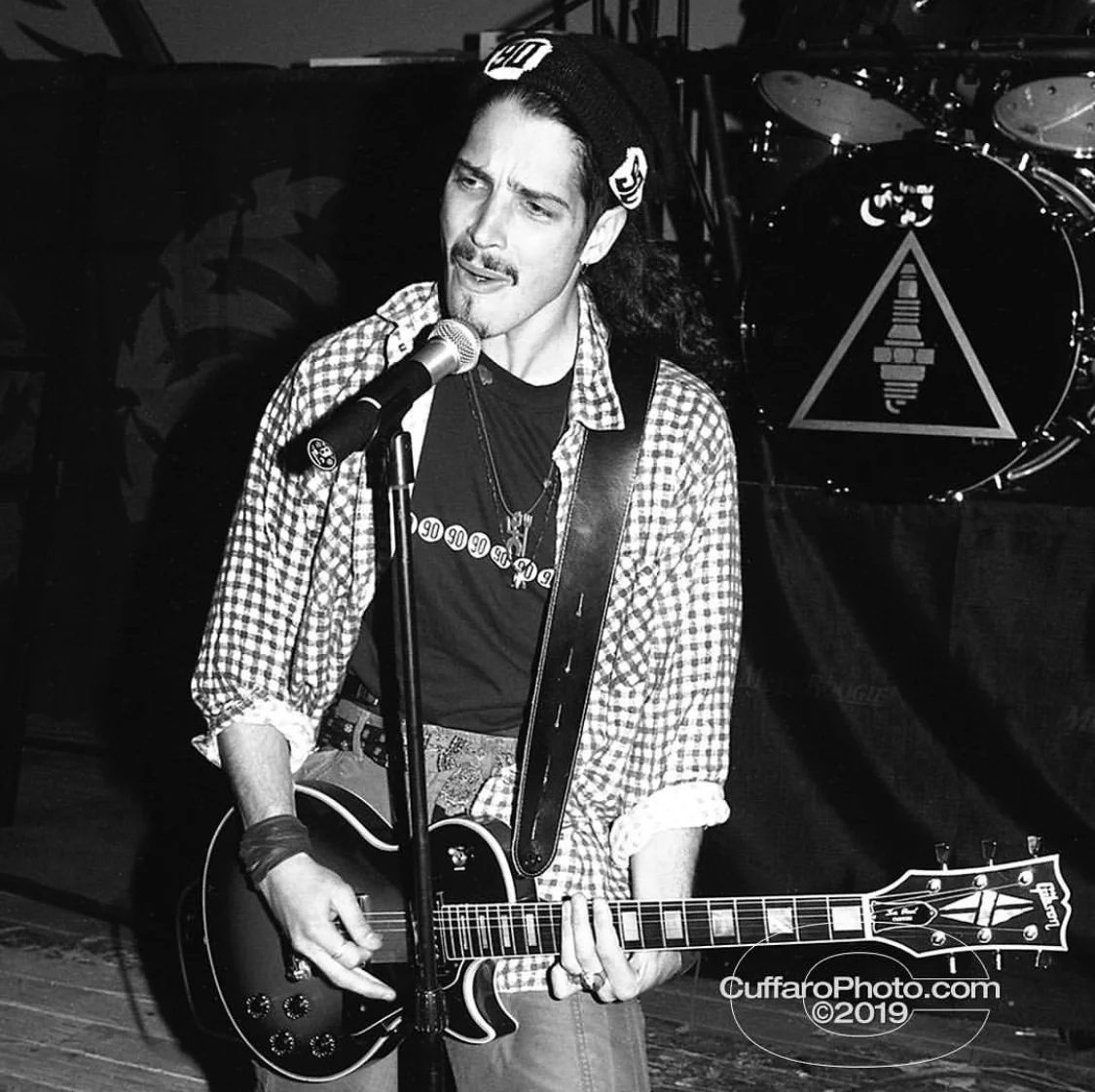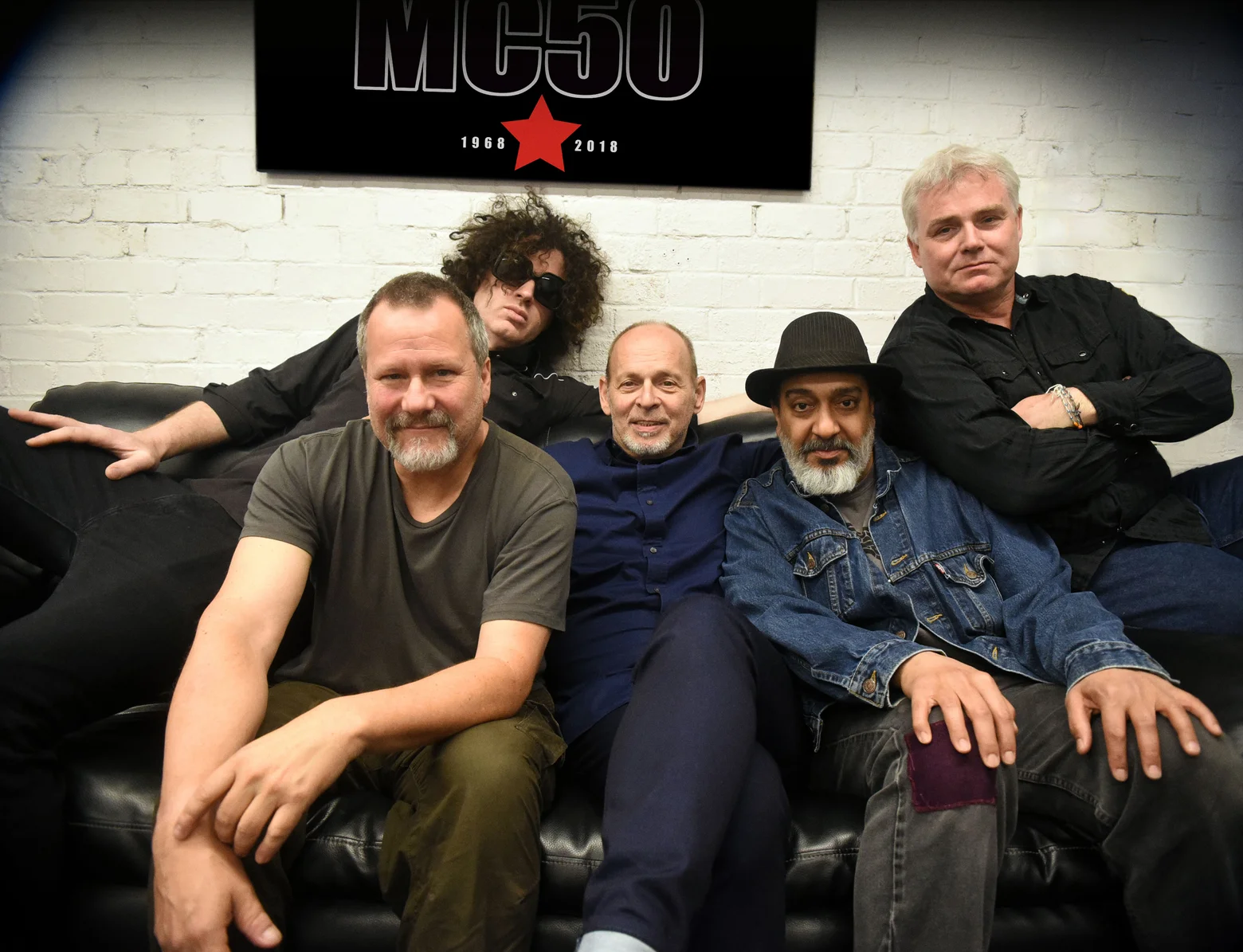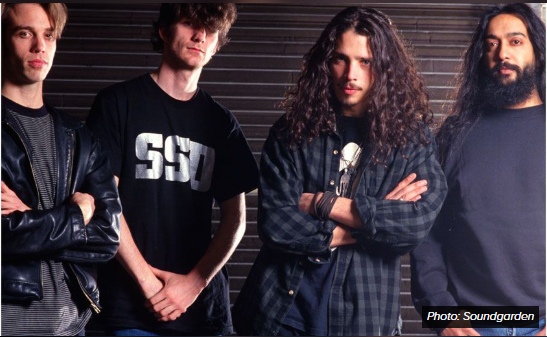RollingStone - "Soundgarden’s Kim Thayil: My Favorite Grunge Albums"
Rolling Stone magazine’s recent “50 Best Grunge Albums “ featured 5 Soundgarden albums, prompting them to reach out to Kim and ask for his personal favorites. Below is the magazine’s write-up of Soundgarden’s albums (plus a couple compilation and side-project records), followed by their follow-up with Kim.
41
Soundgarden, ‘Screaming Life’ (1987)
A far cry from “Black Hole Sun,” Soundgarden’s first big release, Screaming Life, is knotty, trippy and sprawling. At the time, guitarist Kim Thayil didn’t riff so much as swirl his lines around the rhythms, bassist Hiro Yamomoto wrung uncharacteristically chiming notes from his instrument and Chris Cornell was a topless howling banshee. Opener, “Hunted Down,” which was also the band’s first single, rattles and lunges unpredictably, as Cornell sings about wearing a “permanent disguise”; “Tears to Forget” boasts harder-hitting rhythms than the version on the Deep Six comp; and “Hand of God” is like a twisted, stuttering heavy-metal funk song (something the band would attempt somewhat more seriously on their bizarre cover of the Ohio Players’ “Fopp,” off the Fopp EP, which Sub Pop has added to Screaming Life). “Prior to Screaming Life, we were kind of angular and jagged,” Thayil once told Rolling Stone. “We did a lot of psychedelic stuff built around the feedback and Hiro’s bass lines. Gradually, that psychedelia made it so I was pushed into doing solos. Then the riffs started getting heavier. You just see how the audience responded to what we were doing, and you flow with that. Our songs started getting a little bit slower and heavier.” The record was pure art-punk, and it showed just how malleable grunge could be. K.G.
28
Soundgarden, ‘Louder Than Love’ (1989)
Grunge’s major-label debut is a lumbering, lubricious, pistol-whipping blow to the head. Although songs like the revolutionary-minded “Gun,” orgy-themed “Full On Kevin’s Mom” and the tongue-in-cheek “Big Dumb Sex” (“I know what to do/I’m gonna fuck, fuck, fuck, fuck you” in full stereophonic glory) are decidedly not ready for primetime, the album climbed into the lower half of the Billboard 200 and proved to be influential, inspiring Metallica’s Kirk Hammett to write the riff for “Enter Sandman” (“I was trying to capture their attitude toward big, heavy riffs,” he said) and providing cover fodder for Guns N’ Roses, who interpolated “Big Dumb Sex” into T. Rex’s “Buick McCane.” Future Pantera producer Terry Date worked with the band and helped them play up their metal edge, but that obscured the irony of some of the songs, which were more “meta” than metal. “I’ve learned that parody only works if you’re ‘Weird’ Al Yankovic and that’s what you do,” Chris Cornell said in 1994 of GN’R’s appropriation of “Big Dumb Sex.” “If you listen to that song, and you don’t know the band, and you don’t know that we’re joking, then it is [like] Aerosmith.” The band would revamp its sound on its next record, 1991’s Badmotorfinger, following Cornell’s more traditionally rock-oriented Temple of the Dog side project and the departure of bassist and prolific songwriter Hiro Yamomoto, making the unwieldiness of Louder Than Love all the more impressive in hindsight. They couldn’t have taken this sound any farther. K.G.
23
Soundgarden, ‘Ultramega OK’ (1988)
When Soundgarden recorded “All Your Lies” for the Deep Six comp in 1986, the track was a messy, herky-jerky guitar explosion, and Chris Cornell snarled on it like a cat in heat; he even gave it a little demon laugh. The band overhauled the tune for its first full-length, the Grammy-nominated Ultramega OK, released two years later, and turned it into a bulldozing punk-metal juggernaut with a faster tempo and more cutting vocal attack. “We were unclassifiable,” Cornell said shortly before his death, “but we were unselfconscious about songwriting so we weren’t manufacturing anything.” That carefree aggressive sensibility resounds on the album’s leering, Led Zeppy “Flower,” the lumbering “Incessant Mace,” the locomotive “Mood for Trouble” (which spins the riff from the Doobie Brothers’ “Long Train Runnin'” on its head) and concert showstopper “Beyond the Wheel,” on which Cornell stretches his vocal chords across three octaves, and guitarist Kim Thayil and bassist Hiro Yamomoto make their instruments flutter. “I was trying to ratchet up the intensity,” Cornell told Rolling Stone of the latter song in a previously unpublished interview. “I remember thinking, ‘Is this going to seem like sort of a geek trick [showing] I could sing in three octaves?’ I was trying to avoid that. Ultimately it became one of those songs where it could never be a radio single, it was on an indie album, but it’s one that people always react to as though it were a hit song on the radio.” K.G.
22
Various Artists, ‘Deep Six’ (1986)
Leaf through the pages of the freshman class of Seattle grunge’s yearbook — a.k.a. the booklet that accompanied the 1986 multi-band compilation Deep Six — and you’ll see Melvins’ Buzz Osborne rolling his eyes back into his skull while digging his pick into his guitar; Soundgarden’s Chris Cornell, shirtless and muscular, channeling Iggy Pop; and Malfunkshun’s Andy Wood mugging like a New York Doll. The comp is an invaluable document of where it all began. The record, which came out on the Seattle label C/Z, collects 14 ragers from Soundgarden, Melvins, Green River (which begot Pearl Jam and Mudhoney), Skin Yard (featuring guitarist turned producer Jack Endino), Malfunkshun (Mother Love Bone singer Andy Wood’s first band) and the U-Men. The recordings are crude and heavy — Deep Six’s highlights include Soundgarden’s Devo-ish “All Your Lies,” Melvins’ furious “Blessing the Operation” and Green River’s seething “10,000 Things” — but that raw vitality is part of its charm. This is basically an ultrasound of grunge in utero. When Melvins paid tribute to Chris Cornell earlier this year, they included Malfunkshun’s walloping “With Yo’ Heart (Not Yo’ Hands)” in the set, ostensibly as a nod to Wood’s influence over Cornell and the scene as a whole. “The Deep Six compilation was really important to us,” Green River drummer Alex Shumway recently told Rolling Stone. “It was the first time we went to a ‘real studio.’ It had this mind-blowing feel to it. And it’s like everybody on Deep Six has become famous or there’s a person in the band that has moved on in the industry.” K.G.
19
‘Singles: Original Motion Picture Soundtrack’ (1992)
With Cameron Crowe writing and directing and Matt Dillon and Bridget Fonda leading the cast, the flanneled rom-com Singles symbolized grunge’s cultural-crossover moment. But starting with the fact that Crowe had begun working on it pre-Nevermind and that he had his own personal bond with Seattle (his then-wife, Heart’s Nancy Wilson, was a longtime resident), Singles was far from a crass cash-in. And its accompanying soundtrack, released several months in advance, was a note-perfect introduction to the scene by way of new, direct-to-Singles contributions from many of its leading lights. Some of those tracks — Pearl Jam’s ferocious “Breath” and “State of Love and Trust,” Screaming Trees’ burly “Nearly Lost You” and Alice in Chains’ Andrew Wood homage “Would?” — were peak grunge moments, and Chris Cornell’s acoustic “Seasons” captured the lesser-known psych-folk side of the scene. (Tracks by Jimi Hendrix and Ann and Nancy Wilson’s Lovemongers side project also reminded everyone that Seattle rock didn’t start with grunge, either.) Crowe, a fan of the way director Mike Nichols used Simon and Garfunkel songs in The Graduate, called the Singles soundtrack “like a little Graduate moment that happened. Singles felt like an opportunity to really fly into the arms of that feeling.” D.B.
9
Soundgarden, ‘Superunknown’ (1994)
By 1994, grunge had taken over the radio, the festival world (Lollapalooza) and MTV, but where could it go from there, especially as an art form? Soundgarden knew: The band had to show it wasn’t just that month’s flavor but the next phase of rock itself. As Chris Cornell later told RS, “I felt like all of us were going to have to prove that we deserved to be playing on an international stage, and to have videos on TV and songs on the radio, and it wasn’t just a fad like the ‘British invasion’ or a ‘New York noise scene.'” In the face of that pressure, Cornell and his bandmates wrote their most robust group of songs — from bucking-bronco rockers like “Drown Me” and “Superunknown” to dark psychedelia like “Black Hole Sun” and “Fell on Black Days” — and producer Michael Beinhorn sculpted the splattered-paint fury of their early days into something colossal. The result was a fourth album that coincidentally was Soundgarden’s own Led Zeppelin IV: a record that revealed new, often subtler facets of the band and instantly felt like one of the landmark hard-rock records of all time. D.B.
7
Temple of the Dog, ‘Temple of the Dog’ (1991)
The death of Mother Love Bone singer Andy Wood in March of 1990 left the Seattle rock community completely devastated. The charismatic frontman was close friends and roommate with Chris Cornell, who poured all his heartache into new songs like “Say Hello 2 Heaven” and “Reach Down.” Once he played them for surviving Mother Love Band members Jeff Ament and Stone Gossard and learned they’d just formed a new band with some guy from San Diego named Eddie Vedder, they all decided to come together and honor Wood by recording them under the moniker Temple of the Dog. It didn’t take for the project to grow into a full album. “It was a time when more importance was placed on albums,” Cornell told Rolling Stone in 2016. “Then it became cathartic and fun.” After Cornell’s shocking death in 2018, the songs of loss and regret took on a whole new meaning. A.G.
2
Soundgarden, ‘Badmotorfinger’ (1991)
After Chris Cornell had a revelation while working on Temple of the Dog, a project that forced him to refocus his songwriting toward catchier and more concise tracks, he led Soundgarden into a new era with Badmotorfinger, the band’s commercial breakthrough. Although drummer Matt Cameron proudly told Rolling Stone, “We don’t make pop records,” when the album came out, it arrived at a time of sea change for heavy rock, and the band scored a trio of hits with “Outshined,” “Jesus Christ Pose” (thanks in part to MTV banning its video) and the rhythmically off-kilter “Rusty Cage” — the last of which Johnny Cash later covered. Each of the songs had a uniquely brutalizing riff, paired with Cornell’s otherworldly, always-perfectly-on-pitch shrieking, that made it a classic. Meanwhile, deeper cuts like “Slaves & Bulldozers” and “Searching With My Good Eye Closed” became live go-tos, because of the way they pummeled audiences. “After Louder Than Love, we kind of had to turn back,” guitarist Kim Thayil once said. “The dark psychedelia, which was replaced by our slight visceral heaviness on Louder Than Love, that came back and so did the quirkiness [on Badmotorfinger].” Soundgarden were heavier than Nirvana and Pearl Jam, but they still wrote anthems, securing them an easy place among the first wave of grunge superstars; the album made it to Number 39 on the Billboard 200 and has since been certified double platinum. It also earned a Grammy nomination. “I love Badmotorfinger because it sounds great in a car,” Thayil once said. “It’s got a lot of weird quirks in it — as is typical with Soundgarden. We always added that element of crazy and weird. We had an ability to not take ourselves too seriously, while committing to the heaviness. Sort of like laughing while kicking your ass.” K.G.
Soundgarden’s Kim Thayil: My Favorite Grunge Albums
From Nirvana’s ‘Bleach’ to ‘God’s Balls’ by Tad, the guitarist shouts out records by Seattle-area bands
Kory Grow April 2, 2019 12:06PM ET
When Rolling Stone compiled our list of the 50 Greatest Grunge Albums, the MVP was clearly Soundgarden. Five of the band’s records made the cut — everything they released from their debut, Screaming Life, through 1994’s Superunknown — and two of those LPs placed in the top 10. Their 1991 album, Badmotorfinger, came in at number two, following only Nirvana’s Nevermind.
The group formed in 1984, playing psychedelic punk on early songs like “Hunted Down” and “All Your Lies,” tracks that showed off Chris Cornell’s jaw-dropping vocal ability. Eventually they introduced genre hallmarks like off-kilter time signatures, heavily thunking riffs and melodic pop songcraft until they were dominating radio playlists with songs like “Outshined” and “Black Hole Sun.” Their trajectory paved the way for many of their peers; they were one of the first bands to sign with Sub Pop and they were the first grunge act to sign with a major label.
Because of Soundgarden’s importance, we reached out to the band’s guitarist, Kim Thayil, to find out what his favorite grunge records are, and how he defines the genre. “I think for a number of years, most of the Seattle bands avoided the term ‘grunge,'” he says. “It’s kind of hard to recall what might be considered grunge or what might have been referred to as metal or pop or punk. I think the easy way to define it would probably be: ‘Seattle-area music of a particular community and genre during a particular period of time from the mid-Eighties to the mid-Nineties.'”
To narrow it down, Thayil — who says he currently has no projects in the works, “just a lot of things on paper and in my head” — picked records by artists that started up mostly in the Seattle area and put out albums on regional labels. Here are his favorites.
Nirvana, Bleach (1989)
I’m picking Bleach for this list on the strength of “Negative Creep,” which would be amazing as a hardcore song or as sort of a metal-grunge song. I also love the riffs on “Blew” and “Swap Meet”; I’d listen to those over and over. That record was so popular with our band when we were touring. We’d play Fugazi, Margin Walker; Meat Puppets II; Neil Young, After the Gold Rush; and Nirvana, Bleach, all the time on a cassette player in our van.
Nivana opened up for us a few times, and we were like, “Shit, these guys are good.” I remember thinking they’ve got some cool songs and Kurt could sing, but their stage presence really didn’t have that confidence or identity yet. Kurt would just stand there and not move, and his hair was in his face. He had zero charisma, except for [the fact] he had a good voice. Chris [Cornell] definitely picked up on his voice. In a year or so, they found their groove and that confidence. Live, it was pretty amazing.
Green River, Dry as a Bone (1987)
Of all the Green River records, I liked Dry as a Bone the best. The first record, Come On Down, is a little bit more grungy I suppose, but it’s not as memorable as the stuff on Dry as a Bone. And their Rehab Doll album is sort of like tipping their hat toward L.A. glam, which I never like that shit, ever. But Dry as a Bone is the one that got me with the vibe that was like the Dead Boys and Aerosmith.
At the time, I think [guitarist] Bruce [Fairweather] was hyping them as being like the Stooges meets Aerosmith. I never really saw the Stooges thing. I also love Dry as a Bone because of its packaging, that sort of [Green River and Pearl Jam bassist] Jeff Ament school of graphics that was popular back then. I love the fact that it’s a quick record, five or six songs and they’re all pretty strong.
Melvins, Gluey Porch Treatments (1987)
I could pick almost anything by Melvins, but I’m going to say Gluey Porch Treatments since it was their debut album. They made a lot of albums that were more inventive creatively and better produced sonically, but I’m picking this one because I like to think of them in that period.
They were the slowest band in the scene, but they started of being the fastest. At times Buzz had this Gene Simmons thing to his vocals, but the music was incredibly arty and somewhat experimental even if they were never self-conscious about it. They may not have been aware they were being so arty at the time, but all the rest of the bands certainly took notice. Just the fact that they slowed down was a big deal. The fact that they have arrangements that would often not repeat was cool too; it would just be a linear sequence: A, B, C, D, N.
U-Men, U-Men EP (1984)
There’s an argument about whether the U-Men are grunge or not. They’re certainly proto-grunge. Everybody kind of looked up to them. They were distinct from all the other bands in Seattle in the early Eighties; most of the bands in Seattle kind of sucked. They were either goofy New Wave or some kind of college butt-rock. And then the U-Men came along and they had these jagged rhythms. They were inventive and had a lot of charisma. Everyone in that fuckin’ band had a presence. It was fun to watch, and the way they related to the audience and each other was great.
Malfunkshun
In the absence of a real Malfunkshun album, I’ll say all Malfunkshun should be on this list. There’s an album called Another Pyrrhic Victory, and Malfunksun had a couple of songs on that, “My Only Fan” and “Shotgun Wedding.” And the Deep Six compilation had “Stars-N-You” and “With Yo’ Heart (Not Yo’ Hands).” Those are amazing songs. And there’s a Malfunkshun album [Return to Olympus] that’s posthumous on the Loosegroove label.
That band was very inspirational and influential, just because they were heavy as shit. Kevin Wood’s guitar playing was way fast and not coherent; it was this chaotic, crazy fast thing. And [singer] Andrew [Wood] was crooning, dressed-up and comical, and then when the riffs came in, it was truly heavy. It was just amazing. They could also have a nice R&B groove when they needed one in the metallic sets. They would refer to themselves as “Mötley Crüe North” or “Kiss West Coast.” It was hilarious.
Andy Wood was a fun guy. He was definitely a character and a personality. [Editor’s note: Wood died in 1990.] Even at shows Malfunkshun didn’t play, we’d get Andy to MC as “Landrew, the Love Master of Ceremonies.” There were a few shows we were headlining, and Landrew would come out and introduce each band, and he would come down from “Olympus” and introduce the bands. It was hilarious. He was wearing these giant Smurf boots, and he’s got makeup on.
Skin Yard, Hallowed Ground (1988)
I don’t think any of us [in Soundgarden] really liked the first Skin Yard record, but we liked them as people and the uniqueness of what they were trying to do. Then they became heavier, more in the mold of Soundgarden or Tad, and they started making better records that were kind of fun. By the time they put out Hallowed Ground, they were getting into the groove and had the rock idea going.
Jack Endino was experimental as a guitarist, but he’s got a background that’s all rock. He’s the one who turned me on to Budgie and the Groundhogs back in the early Eighties, and of course he loved Sabbath. He likes big riffs. On Hallowed Ground and the subsequent records, they really captured Jack’s interest and his strength as a rock fan and rock guitar player. When the songs got stripped out a little bit to become more rock, it was also a lot easier for [vocalist] Ben [McMillan] to develop lyrics and melodies that would fit, so I think on this one you get the best of Ben McMillan and Jack Endino. [Pauses] And we got the best of Skin Yard when their drummer, Matt Cameron, came over and joined us.
Mudhoney, Superfuzz Bigmuff (1988)
Mudhoney had this great presence from [singer-guitarist] Mark [Arm]. And I always liked the way Steve [Turner] played guitar; I liked his solos, because they were loose and somewhat expressive. It’s easy to be supportive of them. I’m putting Superfuzz Bigmuff on this list for no other reason than the song “In ‘n’ Out of Grace,” which his probably still my favorite Mudhoney song. I love the line, “Oh, God, how I love to hate,” and the way it kicks back in from Danny [Peters’] drum solo. It’s just an amazing moment every time they do it live. And the groove is cool; it’s this weird Blue Cheer thing.
Tad, God’s Balls (1989)
I’m picking God’s Balls because of [bassist] Kurt [Danielson’s] poetic background. I think some of that insight contributed to the band. And then I love Gary [Thorstensen’s] inventive guitar playing and use of feedback. He had colors to augment what would otherwise be the same old linear groove. That album was so important because it helped establish Tad as an influential and significant artist from the Seattle scene. They weren’t just knuckleheads.
When they came out, they were marketing [frontman Tad Doyle] as some kind of retarded lumberjack, but he’s an incredibly smart, articulate multi-instrumentalist and a producer and engineer himself. They had him write his name left-handed on the single: “My Name is Tad.” What the fuck? It was silly and obnoxious because Tad’s a super smart guy.
Screaming Trees, Clairvoyance (1986)
I don’t know what you’d call them, but they were probably grunge at least by fashion. They were wearing flannel independently of us. I like Clairvoyance for the song “Clairvoyance,” but my favorite song on there is probably “I See Stars” followed by “Orange Airplane.” After this album, they kind of fattened up their sound.
Their influence and impact on us and on Seattle was definitely significant. They were influential in getting us on [the record label] SST. They came to see us out in Ellensburg [Washington] and they talked us up to Greg [Ginn] and Chuck [Dukowski]. SST was our favorite label in the early to mid-Eighties. Since then, [Soundgarden bassist] Ben [Shepherd] has worked with [Screaming Trees frontman Mark] Lanegan, Chris [Cornell] co-produced Screaming Trees’ Uncle Anesthesia and they were managed by our manager for most of our career, Susan Silver, at some point. They were very much part of the family.
Alice in Chains, Facelift (1990)
Alice in Chains came from a different scene, but then started playing with us and Pearl Jam, and they played some shows with Nirvana on Facelift. I think of a song like “It Ain’t Like That,” and I love the groove. When I would play with them onstage, they’d ask me what song I want to do, and that was the one. [Sings the opening riff] I love that riff and that song. I wish I’d written it, and that’s why I love that album — just because of that song. It’s easy to fall in love with something when you think, “Why the fuck didn’t I think of that?” The whole record has great stuff on it.
Pearl Jam, Ten (1991)
Ten was a super album with the super hits. It kind of speaks for itself. Everyone has a copy of that at some point. There’s no question it’s a great record, simply in terms of commercial success, and personally it’s important to me because I know those songs from a live context.
I saw them live a few times before the record came out as [original band name] Mookie Blaylock and as Pearl Jam. Mike McCready and Eddie [Vedder] were strong additions to what Jeff [Ament] and Stone [Gossard] had been doing in their previous bands [Green River and Mother Love Bone]. Mike was a really strong lead guitar player who worked with where their songwriting was going, and it was just emotive. It could do all the things you want a lead guitarist to do, especially for the songs they were writing. And then it complemented one of the greatest rock vocalists ever, someone who was so emotive that the first few times I saw him, I actually had those weird tingles go up my spine. I think Jeff Beck’s done that for me, and Chris [Cornell] and Eddie and Derek Trucks. I’m sure there are other performances that have done that for me, but Eddie’s voice certainly did that.
